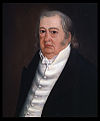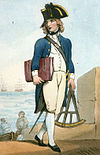| << | Today's featured articles for June 2013 | >> | ||||
|---|---|---|---|---|---|---|
| Su | Mo | Tu | We | Th | Fr | Sa |
| 1 | ||||||
| 2 | 3 | 4 | 5 | 6 | 7 | 8 |
| 9 | 10 | 11 | 12 | 13 | 14 | 15 |
| 16 | 17 | 18 | 19 | 20 | 21 | 22 |
| 23 | 24 | 25 | 26 | 27 | 28 | 29 |
| 30 | ||||||
June 1
The Tichborne case, a Victorian legal cause célèbre, concerned the claim by an individual known as "the Claimant" (pictured) to be the missing heir to the Tichborne baronetcy and fortune. The real Roger Tichborne disappeared after a shipwreck in 1854; later, rumours surfaced that he had survived and made his way to Australia. In 1866 a butcher called Thomas Castro from Wagga Wagga came forward claiming to be Roger Tichborne; he travelled to England where, despite his unrefined manners and bearing, he was accepted by Lady Tichborne as her son. Although other family members were unconvinced, the Claimant gained considerable public support. However, by 1871 evidence suggested that Castro was actually Arthur Orton, a butcher's son from Wapping in London, who had gone to sea as a boy. A civil case ended with charges of perjury against him, and in 1874 a criminal court jury decided that he was indeed Orton. He was sentenced to 14 years imprisonment. He was released in 1884; in 1895 he confessed to being Orton, only to recant immediately. He died destitute in 1898. While most commentators accept that the Claimant was Orton, for some a slight possibility exists that, after all, he was Roger Tichborne. (Full article...)
Recently featured: Cotswold Olimpick Games – New York's 20th congressional district special election, 2009 – The Rite of Spring
June 2
The Boeing 767 is a mid-size, wide-body twin-engine jet airliner built by Boeing Commercial Airplanes. It was the manufacturer's first wide-body twinjet and its first airliner with a two-crew glass cockpit. The aircraft features two turbofan engines, a conventional tail, and for reduced aerodynamic drag, a supercritical wing design. Designed as a smaller wide-body airliner than preceding aircraft such as the 747, the 767 has a capacity of 181 to 375 persons and a design range of 3,850 to 6,385 nautical miles (7,130 to 11,825 km), depending on variant. The original 767-200 entered service in 1982, followed by the 767-300 in 1986 and the 767-400ER, an extended-range variant, in 2000. Versions for freight and military use have also been created. The aircraft was initially flown on domestic and transcontinental routes, before becoming the first twin-engined airliner to receive regulatory approval for extended overseas flights. In 1986, Boeing initiated studies for a higher-capacity 767, ultimately leading to the development of the 777, a larger wide-body twinjet. In the 1990s, the 767 became the most frequently used airliner for transatlantic flights between North America and Europe. (Full article...)
Recently featured: Tichborne case – Cotswold Olimpick Games – New York's 20th congressional district special election, 2009
June 3
The Huế chemical attacks occurred on June 3, 1963, when soldiers of the Army of the Republic of Vietnam poured liquid chemicals from tear gas grenades onto praying Buddhists in Huế, South Vietnam (location of attacks pictured). The Buddhists were protesting against religious discrimination by the regime of President Ngo Dinh Diem, a Roman Catholic. The attacks caused 67 people to be hospitalised for skin blistering and respiratory ailments, and led the United States to threaten privately to withdraw support for Diem. The protests were part of a Buddhist campaign for religious equality after nine people were killed while defying a ban on flying the Buddhist flag. An inquiry determined that the chemical used failed to vaporise as it should have done, exonerating the soldiers from charges that they had used poison or mustard gas. However, Diem had already been forced to appoint a panel of three cabinet ministers to meet with Buddhist leaders for negotiations regarding religious equality. The talks led to the signing of the Joint Communique, but the policy changes it provided were not implemented and widespread protests continued, leading to the assassination of Diem in a military coup. (Full article...)
Recently featured: Boeing 767 – Tichborne case – Cotswold Olimpick Games
June 4
SMS Markgraf was the third battleship of the four-ship König class and served in the German Imperial Navy during World War I. The battleship was launched on 4 June 1913 and commissioned into the Imperial Navy on 1 October 1914, just over two months after the outbreak of war in Europe. Armed with ten 30.5-centimeter (12.0 in) guns in five twin turrets, she could steam at a top speed of 21 knots (39 km/h; 24 mph). Markgraf was named in honor of the royal family of Baden; the name Markgraf is a rank of German nobility. She took part in most of the fleet actions during the war, including the Battle of Jutland in 1916 and Operation Albion, the conquest of the Gulf of Riga, in late 1917. After Germany's defeat, Markgraf was one of the ships interned by the Royal Navy in Scapa Flow while the Allied powers negotiated the final version of the Treaty of Versailles. On 21 June 1919, days before the treaty was signed, the commander of the interned fleet ordered the fleet to be scuttled to ensure that the British would not be able to seize the ships. Unlike most of the scuttled ships, Markgraf was never raised for scrapping; the wreck is still sitting on the bottom of the bay. (Full article...)
Recently featured: Huế chemical attacks – Boeing 767 – Tichborne case
June 5
Stephen Crane (1871–1900) was an American novelist, short story writer, poet and journalist. Prolific throughout his short life, he wrote notable works in the Realist tradition as well as early examples of American Naturalism and Impressionism. Crane's first novel was the 1893 Bowery tale Maggie: A Girl of the Streets. He won international acclaim for his 1895 Civil War novel The Red Badge of Courage, written without any battle experience. Late that year he accepted an offer to cover the Spanish–American War as a war correspondent. As he waited in Jacksonville, Florida, for passage to Cuba, he met Cora Taylor, the madam of a brothel, with whom he would have a lasting relationship. Plagued by financial difficulties and ill health, Crane died of tuberculosis at the age of 28. Although recognized primarily for The Red Badge of Courage, Crane is also known for short stories such as "The Open Boat", "The Blue Hotel", "The Bride Comes to Yellow Sky", and The Monster. His writing made a deep impression on 20th-century writers, most prominent among them Ernest Hemingway, and is thought to have inspired the Modernists and the Imagists. (Full article...)
Recently featured: SMS Markgraf – Huế chemical attacks – Boeing 767
June 6
The Legend of Zelda: Link's Awakening is a 1993 action-adventure video game developed by Nintendo Entertainment Analysis and Development and published by Nintendo for the Game Boy. It is the fourth installment in the Legend of Zelda series, and the first for a handheld game console. What became Link's Awakening began as a port of the Super Nintendo title The Legend of Zelda: A Link to the Past, developed after-hours by Nintendo staff. It grew into an original project under the direction of Takashi Tezuka, with a story and script created by Yoshiaki Koizumi and Kensuke Tanabe. The protagonist Link begins the game stranded on Koholint Island, a place guarded by a creature called the Wind Fish. Link then searches for eight musical instruments that will awaken the sleeping Wind Fish and allow him to escape. A remake called The Legend of Zelda: Link's Awakening DX was released for the Game Boy Color in 1998; it features color graphics, compatibility with the Game Boy Printer, and an exclusive color-based dungeon. Together, the two versions of the game have sold more than six million units worldwide, and have appeared on multiple game publications' lists of the best games of all time. (Full article...)
Recently featured: Stephen Crane – SMS Markgraf – Huế chemical attacks
June 7
James Garrard (1749–1822) was the second governor of Kentucky. He served from 1796 to 1804 and was the last to be elected to consecutive terms until 1999. A Revolutionary War veteran, he held several local offices and unsuccessfully tried to exclude slavery from Kentucky's first constitution. His 1796 election as governor exposed ambiguity in the state constitution, prompting another constitutional convention in 1799. As governor, he opposed the Alien and Sedition Acts, favored passage of the Kentucky Resolutions, and lobbied for public education, militia and prison reforms, business subsidies, and legislation favorable to debtors. He became the first resident of the state's first governor's mansion when it was completed in 1798. A Democratic-Republican, he applauded the Louisiana Purchase as a means of dealing with the closure of the port at New Orleans to U.S. goods. Garrard, a Baptist minister, was expelled from the church in 1802 when his Secretary of State, Harry Toulmin, persuaded him to adopt some doctrines of Unitarianism. After leaving office, he engaged in agricultural and commercial pursuits. Garrard County, Kentucky, was named in his honor. (Full article...)
Recently featured: The Legend of Zelda: Link's Awakening – Stephen Crane – SMS Markgraf
June 8
Norman Selfe (1839–1911) was an Australian engineer, naval architect, inventor, urban planner and outspoken advocate of technical education. After immigrating to Sydney with his family from England as a boy he became an apprentice engineer, following his father's trade. Selfe designed many bridges, docks, boats, and much precision machinery for the city. He also introduced new refrigeration, hydraulic, electrical and transport systems. For these achievements he received international acclaim during his lifetime. Decades before the Sydney Harbour Bridge was built, the city came close to building a Selfe-designed steel cantilever bridge across the harbour after he won the second public competition for a bridge design. Selfe was commemorated in his lifetime by the name of the Sydney suburb of Normanhurst. He was energetically involved in organisations such as the Sydney Mechanics' School of Arts and the Australian Historical Society, and fought consistently for the establishment of an independent system of technical education. He was acknowledged upon his death as one of the best-known people in, and greatest individual influences upon, the city of Sydney. (Full article...)
Recently featured: James Garrard – The Legend of Zelda: Link's Awakening – Stephen Crane
June 9
The Norman Cob is a breed of light draft horse that originated in Normandy in northern France. It has a range of heights and weights due to selective breeding for a wide range of uses and is known for its lively, long-striding trot. Colors accepted by the breed registry include chestnut, bay and seal brown. Norman Cobs are popular for recreational and competitive driving, and are also used for several riding disciplines. In its homeland, the Norman Cob was originally used widely for agriculture, but the advent of mechanization threatened all French draft breeds, and many breeders turned their production towards the meat market. Norman Cob breeders instead crossed their horses with Thoroughbreds to contribute to the Selle Français breed, now France's national saddle horse. This allowed the Norman Cob to remain a light draft horse through the decades, while other draft breeds were growing heavier and slower due to selection for meat. Genetic studies in the 1980s showed the breed suffered from inbreeding and genetic drift. Breed enthusiasts worked to develop new selection criteria for breeding stock, and population numbers are now relatively stable. (Full article...)
Recently featured: Norman Selfe – James Garrard –The Legend of Zelda: Link's Awakening
June 10
The Youngstown Ohio Works baseball team was a minor league club that was known for winning the premier championship of the Ohio–Pennsylvania League in 1905, and for launching the professional career of pitcher Roy Castleton a year later (second row, second from left, in a 1906 team photograph). A training ground for several players and officials who later established careers in Major League Baseball, the team proved a formidable regional competitor and also won the 1906 league championship. During its brief span of activity, the Ohio Works team faced challenges that reflected common difficulties within the Ohio–Pennsylvania League, including weak financial support for teams. Following a dispute over funding, the team's owners sold the club to outside investors, just a few months before the opening of the 1907 season. The club's strong record and regional visibility spurred the growth of amateur and minor league baseball in the Youngstown area, and the community's minor league teams produced notable players throughout the first half of the 20th century. (Full article...)
Recently featured: Norman Cob – Norman Selfe – James Garrard
June 11
The 1998 Pacific hurricane season was a moderately active Pacific hurricane season with seven tropical cyclones directly affecting land. The first tropical cyclone developed on June 11, which was about ten days later than the normal start of the season. The final storm of the year, Hurricane Madeline (pictured), dissipated on October 20. Storm activity in the Central Pacific Ocean was low, with just one tropical depression forming in the basin. Two tropical cyclones from the Eastern Pacific, Darby and Estelle, also entered the central Pacific, with the former entering as a hurricane. The season produced 13 named storms, which was slightly below the average of 16 named storms per season. However, the total of nine hurricanes during the season was equal to the average, and the total of six major hurricanes surpassed the average. The most notable tropical cyclone of the year was Hurricane Isis which killed fourteen people when it made landfall on southern Baja California and coastal Sinaloa in Mexico. Tropical Storm Javier also made landfall on Mexico and a tropical cyclone, Hurricane Lester, affected Central America, causing two deaths in Guatemala. (Full article...)
Recently featured: Youngstown Ohio Works – Norman Cob – Norman Selfe
June 12
Fomitiporia ellipsoidea is a species of polypore fungus in the family Hymenochaetaceae, a specimen of which produced the largest fungal fruit body ever recorded. Found in China, the fruit bodies produced by the species are brown, woody basidiocarps that feed on dead wood and can grow very large under favourable circumstances. They measure 30 centimetres (12 in) or more in length, though typically extending less than a centimetre from the surface of the wood. A number of chemical compounds have been isolated from the species, including several steroidal compounds. These may have pharmacological applications, but further research is needed. The species was first recorded in 2008 by Bao-Kai Cui and Yu-Cheng Dai in Fujian Province; it was revealed in 2011 that they had found a very large fruit body, measuring up to 1,085 cm (427 in) in length, on Hainan Island. The specimen (pictured), which was 20 years old, was estimated to weigh between 400 and 500 kilograms (880 and 1,100 lb). This was markedly larger than the previous record holder, a specimen of Rigidoporus ulmarius found in the United Kingdom, which had a circumference of 425 cm (167 in). (Full article...)
Recently featured: 1998 Pacific hurricane season – Youngstown Ohio Works – Norman Cob
June 13
The Isabella quarter was a United States commemorative coin struck in 1893, and is the only U.S. commemorative quarter that was not intended for circulation. It was authorized by Congress at the request of the Board of Lady Managers of the World's Columbian Exposition. The Board wanted a woman to design it, but the sculptor Caroline Peddle left the project after disagreements with Bureau of the Mint officials, who then decided to have the Mint's Chief Engraver Charles E. Barber do the work. The coin depicts Queen Isabella I of Castile, in Spain, who sponsored Columbus's voyages to the New World. The reverse, showing a kneeling woman winding flax, symbolizes women's industry. The quarter's design was deprecated in the numismatic press. The coins did not sell well at the Exposition; its price of $1 was the same as for the Columbian half dollar and the quarter was seen as the worse deal. Nearly half of the authorized issue was returned to the Mint to be melted; thousands more were purchased at face value by the Lady Managers and entered the coin market in the early 20th century. Today, they are popular with collectors and valued in the hundreds to thousands of dollars. (Full article...)
Recently featured: Fomitiporia ellipsoidea – 1998 Pacific hurricane season – Youngstown Ohio Works
June 14
In the United Kingdom, representative peers were elected by the members of the Peerage of Scotland and the Peerage of Ireland to sit in the British House of Lords. The system was introduced in 1707, when England and Scotland became the Kingdom of Great Britain (Act of Union 1707 pictured). At the time, there were 168 English and 154 Scottish peers, but the English population was roughly five times greater than that of Scotland. The English peers feared that the House of Lords would be swamped, and arranged for the election of a small number of Scottish peers. A similar arrangement was adopted when the Kingdom of Great Britain and the Kingdom of Ireland merged into the United Kingdom of Great Britain and Ireland in 1801. Scotland elected 16 representative peers, who sat for the duration of a Parliament, while Ireland elected 28, who sat for life. Elections for Irish peers ceased when the Irish Free State gained independence in 1922, although already-elected Irish peers were entitled to sit until their death; the last was the 4th Earl of Kilmorey, who died in 1961. Elections for Scottish peers ended in 1963, when they all obtained the right to sit in the House of Lords. (Full article...)
Recently featured: Isabella quarter – Fomitiporia ellipsoidea – 1998 Pacific hurricane season
June 15
Atlantis: The Lost Empire is the first science fiction film in Disney's animated features canon and the 41st overall. Set in 1914, the film tells the story of a young man who gains possession of a sacred book, which he believes will guide him and a crew of adventurers to the lost city of Atlantis. Linguist Marc Okrand created an Atlantean language for the film (letter "A" pictured). Atlantis made greater use of computer-generated imagery than any of Disney's previous animated features; it remains one of the few to have been shot in anamorphic format. Atlantis, which adopted the distinctive visual style of comic book creator Mike Mignola, is one of the few Disney animated features not to have songs. The film premiered at the El Capitan Theatre in Hollywood, California, on June 3, 2001, and went into general release on June 15. Due to the film's poorer-than-expected box-office performance, Disney quietly canceled both a spin-off television series and an underwater attraction at its Disneyland theme park. Some critics praised it as a unique departure from typical Disney animated features, while others disliked it due to the unclear target audience and absence of songs. (Full article...)
Recently featured: Representative peer – Isabella quarter – Fomitiporia ellipsoidea
June 16
The Aylesbury duck is a large white breed of domesticated duck. Raising white ducks became popular in Aylesbury, Buckinghamshire, England in the 18th century owing to the demand for white feathers as a filler for quilts. Over the 19th century selective breeding for size, shape and colour led to the Aylesbury duck. The opening of a railway to Aylesbury in 1839 gave access to the markets of London, making rearing Aylesbury ducks highly profitable. By the beginning of the 20th century competition from the Pekin duck, inbreeding and disease in the pure-bred Aylesbury strain and the rising cost of duck food meant the Aylesbury duck industry was in decline; the two world wars further damaged the industry. By the 1950s only one significant flock of Aylesbury ducks remained in Buckinghamshire, and by 1966 there were no duck breeding or rearing businesses of any size remaining in Aylesbury itself. Although there is only one surviving flock of pure Aylesbury ducks in the United Kingdom and the breed is critically endangered in the United States, the Aylesbury duck remains a symbol of the town, and appears on its coat of arms and on the club badge of Aylesbury United. (Full article...)
Recently featured: Atlantis: The Lost Empire – Representative peer – Isabella quarter
June 17
Lynn Hill (born 1961) is an American rock climber. Widely regarded as one of the leading competitive sport climbers in the world during the late 1980s and early 1990s, she made the first ascent without aid of the difficult sheer rock face of The Nose on El Capitan in Yosemite Valley and the first free ascent in 24 hours. Hill shaped rock climbing for women and became a public spokesperson, helping it gain wider popularity and arguing for gender equity. She has publicized climbing by appearing on television shows and documentaries and writing an autobiography, Climbing Free: My Life in the Vertical World. She took to climbing at a young age and became a part of the climbing community in Southern California and Camp 4 in Yosemite Valley. During the early 1980s, she traveled around the United States, climbing increasingly difficult routes and setting records not only for first female ascents but also for first ascents. From 1986 to 1992 she won over thirty international titles, including five victories at the Arco Rock Master; she left competitive climbing in 1992. She has been described as both one of the best female climbers in the world and one of the best climbers of all time. (Full article...)
Recently featured: Aylesbury duck – Atlantis: The Lost Empire – Representative peer
June 18
A midshipman is an officer cadet or a commissioned officer of the junior-most rank, in the Royal Navy, United States Navy, and many Commonwealth navies. In the 17th century, a midshipman was a rating for an experienced seaman, and the word derives from the area aboard a ship, amidships, where he worked or was berthed. Beginning in the 18th century, a commissioned officer candidate was rated as a midshipman, and the seaman rating began to slowly die out. By the Napoleonic era (1793–1815), a midshipman (pictured) was an apprentice officer who had previously served at least three years as a volunteer, officer's servant or able seaman, and was roughly equivalent to a present day petty officer in rank and responsibilities. After serving at least three years as a midshipman, he was eligible to take the examination for lieutenant. Midshipmen in the US Navy were trained and served similarly to those in the Royal Navy, although a midshipman was a warrant officer rank until 1912. During the 19th century, changes in naval officer training in the Royal Navy and the US Navy replaced apprenticeship aboard ships with schooling in a naval college, and "midshipman" began to mean an officer cadet. (Full article...)
Recently featured: Lynn Hill – Aylesbury duck – Atlantis: The Lost Empire
June 19
Angelina Jolie (born 1975) is an American actress, film director, and screenwriter. She has received an Academy Award for Best Supporting Actress (for her performance in the 1999 drama Girl, Interrupted), two Screen Actors Guild Awards, and three Golden Globe Awards, and was named Hollywood's highest-paid actress by Forbes in 2009 and 2011. Jolie promotes humanitarian causes as a Special Envoy and former Goodwill Ambassador for the United Nations High Commissioner for Refugees. She has often been cited as the world's "most beautiful" woman. Jolie made her screen debut as a child alongside her father Jon Voight in Lookin' to Get Out (1982). Her first leading role in a major film was in the cyber-thriller Hackers (1995). She achieved wide fame after her portrayal of video game heroine Lara Croft in Lara Croft: Tomb Raider (2001), and received critical acclaim for her performances in the dramas A Mighty Heart (2007) and Changeling (2008). She made her directorial debut with the wartime drama In the Land of Blood and Honey (2011). Divorced from actors Jonny Lee Miller and Billy Bob Thornton, Jolie now lives with actor Brad Pitt, in a relationship notable for fervent media attention. (Full article...)
Recently featured: Midshipman – Lynn Hill – Aylesbury duck
June 20
Odyssey Number Five is the fourth studio album by Australian rock band Powderfinger (lead guitarist Ian Haug pictured), produced by Nick DiDia and released on 4 September 2000. The album was the band's shortest yet, focusing on social, political, and emotional issues that had appeared in prior works, especially Internationalist. The album produced four singles. The most successful, "My Happiness", reached number 4 on the ARIA Singles Chart, won the 2001 ARIA Music Award for "Single of the Year", and topped Triple J's Hottest 100 in 2000. The album also featured "These Days", which topped Triple J's Hottest 100 in 1999. The album was also ranked at number 1 in Triple J's Hottest 100 Australian Albums of All Time poll in 2011. Many critics lauded the album as Powderfinger's best work; one stated that the album was "the Finger's Crowning Glory", however, others were critical of the "imitation" contained in the album. Overall, the album won five ARIA Music Awards in 2001 and was certified platinum seven times. Odyssey Number Five was Powderfinger's first album to chart in the United States, and the band toured extensively around North America to promote its release. (Full article...)
Recently featured: Angelina Jolie – Midshipman – Lynn Hill
June 21
Ezra Meeker (1830–1928) was an American pioneer who traveled the Oregon Trail by ox-drawn wagon in 1852, migrating from Iowa to the Oregon Territory with his wife and newborn son. Although they endured hardships in the journey of nearly six months, the entire Meeker party survived. In 1862, he settled at the present site of Puyallup, Washington, where he grew hops for use in brewing beer. His business made him wealthy, and he served as Puyallup's first mayor, but an infestation of hop aphids in 1891 destroyed his crops and took much of his fortune. He made four trips to the Klondike during the gold rush there, bringing groceries in an unsuccessful attempt to recoup his losses. After the turn of the 20th century, Meeker, convinced that the Oregon Trail was being forgotten, determined to bring it publicity. In 1906–1908, although in his late 70s, he retraced his steps along the Oregon Trail by wagon, seeking to build monuments in communities along the way; he reached New York and Washington, D.C., where he met President Theodore Roosevelt. He wrote several books, and traveled the Trail again several times in the final two decades of his life, including by airplane in 1924. (Full article...)
Recently featured: Odyssey Number Five – Angelina Jolie – Midshipman
June 22
Plunketts Creek Bridge No. 3 was a rubble masonry stone arch bridge over Plunketts Creek in Plunketts Creek Township, Lycoming County, in the U.S. state of Pennsylvania. It was built between 1840 and 1875, probably closer to 1840, when the road along the creek between the villages of Barbours and Proctor was constructed. It was named as the third bridge to cross the creek, and was 75 feet (23 m) long. Its arch spanned 44 feet (13 m), and its deck was 18 feet 8 inches (5.69 m) wide. It carried a single lane of traffic, about 450 vehicles a day in 1996. The lumber, leather, and coal industries used the bridge and its road in the 19th century. These almost all left by the early 20th century, and the villages declined. The area the bridge served reverted mostly to second growth forest and it was used to access Pennsylvania State Game Lands and a state pheasant farm. Plunketts Creek Bridge No. 3 was considered "significant as an intact example of mid-19th century stone arch bridge construction", and was added to the National Register of Historic Places (NRHP) on June 22, 1988. The bridge was demolished after severe flood damage in January 1996, and it was removed from the NRHP in 2002. (Full article...)
Recently featured: Ezra Meeker – Odyssey Number Five – Angelina Jolie
June 23
Laura Secord (1775–1868) was a Canadian heroine of the War of 1812, who undertook a 20-mile (32 km) walk out of American-occupied territory to warn British forces of an impending American attack. Secord's husband James was wounded at the Battle of Queenston Heights in 1812, and was still recovering when the Americans invaded the Niagara Peninsula in 1813. During the occupation, Secord learned of a planned American attack, and stole away on the morning of 23 June to inform Lieutenant James FitzGibbon in the territory still controlled by the British. The information helped the British and their Mohawk warrior allies repel the invading Americans at the Battle of Beaver Dams. Her contribution to the war was little known during her lifetime, but since her death she has been frequently honoured by Canada. Honours bestowed on her include schools and a chocolate company named after her, as well as monuments, a museum, a memorial stamp, and a statue at the Valiants Memorial in the Canadian capital. Her story has taken on mythological overtones in her home country, with many embellished versions of the tale, and she is the subject of books, poetry, and plays. (Full article...)
Recently featured: Plunketts Creek Bridge No. 3 – Ezra Meeker – Odyssey Number Five
June 24
Hiram Wesley Evans (1881–1966) was Imperial Wizard of the Ku Klux Klan, an American white supremacist group, from 1922 to 1939. Evans, a dentist, joined the Klan's Dallas chapter in 1920. He quickly rose through the ranks and, after ousting William J. Simmons as Imperial Wizard, sought to transform the group into a political juggernaut. Although Evans had led the kidnapping and torture of a black man while leader of the Dallas Klan, as Imperial Wizard he publicly discouraged vigilante actions. He also led major gatherings and marches, endorsed several successful candidates in state elections, and promoted the Klan as a nativist, Protestant group. Despite these efforts, the Klan was buffeted by damaging publicity in the early 1920s, and the Great Depression of the 1930s severely damaged the Klan's finances and Evans' own income. In 1939 Evans, having lost favor within the Klan for disavowing anti-Catholicism, was succeeded by James A. Colescott; the following year he was fined $15,000 for price fixing. Historians credit Evans with refocusing the Klan on political activities and recruiting outside the Southern United States but they note that the political influence and membership gained were transitory. (Full article...)
Recently featured: Laura Secord – Plunketts Creek Bridge No. 3 – Ezra Meeker
June 25
The 2012 tour of She Has a Name was a fringe theatre tour across Canada of Andrew Kooman's She Has a Name, a play about human trafficking. The tour was co-produced by Burnt Thicket Theatre and Raise Their Voice and was directed by Stephen Waldschmidt. The five-person cast featured Carl Kennedy, Evelyn Chew, Glenda Warkentin, Alysa van Haastert, and Sienna Howell-Holden. Despite the fact that She Has a Name is set in Southeast Asia, the producers deliberately cast mostly actors who were not of Asian descent to avoid the impression that human trafficking happens only in Asia. Panel discussions were held after the Saturday matinées during the tour to raise awareness about human trafficking that takes place in Canada and elsewhere. A Better World (ABW) partnered with Raise Their Voice throughout the tour; while She Has a Name toured across Canada to raise awareness about human trafficking, ABW raised money to help women and children who had been trafficked in Thailand as part of the country's prostitution industry. Critical ratings of the performances that employed stars ranged between 3 and 5 stars out of 5. (Full article...)
Recently featured: Hiram Wesley Evans – Laura Secord – Plunketts Creek Bridge No. 3
June 26
The 1898 United States Senate election in Ohio took place in that state's legislature on January 12. The Republican incumbent, Mark Hanna, had been appointed by Governor Asa Bushnell on March 5, 1897, to fill the vacancy caused by the resignation of John Sherman; the appointment was only good until the legislature met and made its own choice. Republicans kept their majority in the election that November, apparently assuring Hanna's election once the new body met in January 1898. However, the Ohio Republican party was bitterly divided into two factions. Before the legislative session, the Democrats allied with a number of Republicans, seeking to defeat Hanna, and took control of both houses of the legislature. Intense politicking took place and some lawmakers went into hiding fearing pressure by the other side. The coalition decided on Cleveland Mayor Robert McKisson as their candidate the day before the balloting began. Three Republican state representatives who had voted with the Democrats to organize the legislature switched sides and voted for Hanna, who triumphed with a bare majority. Bribery was alleged; legislative leaders complained to the US Senate, which took no action. (Full article...)
Recently featured: 2012 tour of She Has a Name – Hiram Wesley Evans – Laura Secord
June 27
The women's road race was one of the cycling events at the 2008 Summer Olympics in Beijing, China. It took place on 10 August 2008, featuring 66 women from 33 countries. Heavy rain during the entire race made conditions difficult for the competitors. A group of five was able to break away during the final lap and worked together until the final sprint, where Nicole Cooke placed herself in position to win the race. Cooke earned Great Britain's first medal at these Games and 200th Olympic gold medal overall. Emma Johansson of Sweden and Tatiana Guderzo of Italy won the silver and bronze medals respectively. The race also marked the first positive drug test of the 2008 Olympic Games, by María Isabel Moreno of Spain. It was the seventh appearance of an Olympic women's road race event and featured a longer course than any of the previous six races. The race was run on the Urban Road Cycling Course (one of Beijing's nine temporary venues), which is 102.6 kilometres (63.8 mi) in its entirety. Including a second lap around the 23.8 km (14.8 mi) final circuit, the total distance of the women's race was 126.4 km (78.5 mi), less than half the length of the men's race. (Full article...)
Recently featured: United States Senate election in Ohio, 1898 – 2012 tour of She Has a Name – Hiram Wesley Evans
June 28
Jürgen Ehlers (1929–2008) was a German physicist who contributed to the understanding of Albert Einstein's theory of general relativity. From graduate and postgraduate work in Pascual Jordan's relativity research group at Hamburg University, he held academic posts before joining the Max Planck Institute for Astrophysics in Munich as a director. In 1995, he became the founding director of the newly created Max Planck Institute for Gravitational Physics (Albert Einstein Institute) in Potsdam, Germany. Ehlers' research focused on the foundations of general relativity as well as on the theory's applications to astrophysics. He formulated a suitable classification of exact solutions to Einstein's field equations and proved the Ehlers–Geren–Sachs theorem that justifies the application of simple, general-relativistic model universes to modern cosmology. He created a spacetime-oriented description of gravitational lensing and clarified the relationship between models formulated within the framework of general relativity and those of Newtonian gravity. He had a keen interest in the history and philosophy of physics and was an ardent popularizer of science. (Full article...)
Recently featured: Cycling at the 2008 Summer Olympics – Women's road race – United States Senate election in Ohio, 1898 – 2012 tour of She Has a Name
June 29
HMS Speedy was a 14-gun Speedy-class brig of the British Royal Navy. Launched in 1782 at Dover, Speedy initially served off the British coast. Transferred to the Mediterranean after the outbreak of the French Revolutionary Wars, she spent the rest of her career there, winning fame for herself in various engagements and often against heavy odds. Her first commander in the Mediterranean, Charles Cunningham, served with distinction with several squadrons, assisting in the capture of several war prizes. His successor, George Cockburn, impressed his superiors with his dogged devotion to duty. Speedy's next commander, George Eyre, lost her to a superior French force on 9 June 1794. She was soon retaken, and re-entered service under Hugh Downman, who captured a number of privateers between 1795 and 1799. His successor, Jahleel Brenton, fought a number of actions against Spanish forces off Gibraltar. Her last captain, Lord Cochrane, forced the surrender of a much larger Spanish warship, the Gamo. Speedy was finally captured by a powerful French squadron in 1801 and donated to the Papal Navy by Napoleon the following year. She spent five years with them under the name San Pietro, and was broken up in 1807. (Full article...)
Recently featured: Jürgen Ehlers – Cycling at the 2008 Summer Olympics – Women's road race – United States Senate election in Ohio, 1898
June 30
The golden-crowned sifaka is a medium-sized lemur characterized by mostly white fur, prominent furry ears and a golden-orange crown. It is one of the smallest sifakas, weighing around 3.5 kg (7.7 lb) and measuring approximately 90 cm (35 in) from head to tail. Like all sifakas, it is a vertical clinger and leaper, and its diet includes mostly seeds and leaves. The golden-crowned sifaka lives in groups of around five to six individuals, with groups containing a balanced number of adult males and females. Its binomial name, Propithecus tattersalli, denotes its discoverer, Ian Tattersall, who first spotted it in 1974. Found in gallery, deciduous, and semi-evergreen forest, its restricted range includes forest fragments around the town of Daraina in northeast Madagascar. Its estimated population is between 6,000 and 10,000 individuals. Forest fragmentation, habitat destruction, poaching, slash-and-burn agriculture, and other human factors threaten its existence, and it is listed by the IUCN Red List as Endangered. Lawlessness resulting from the 2009 political coup in Madagascar led to increased poaching of this species, and many were sold to local restaurants as a delicacy. (Full article...)
Recently featured: HMS Speedy – Jürgen Ehlers – Cycling at the 2008 Summer Olympics – Women's road race




























